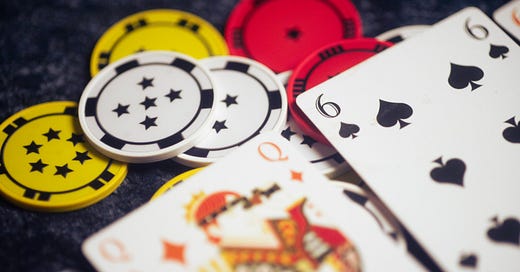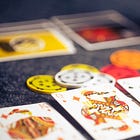Flip 7, Looot stand out among 2025 Spiel des Jahres nominees
The annual gaming award nominees were announced.
This year’s nominees for the most prestigious prize in board games, the Spiel des Jahres, were announced yesterday. The timing couldn’t have been better: I’ve been trying to figure out what to write about, especially as I’m away from home and thus away from nearly all of my games. I’ve even played some (but not all) of the nominees, and I’m excited to talk about a few of them.
Flip 7 (Olsen, 2024) and Looot (Chevallier and Escoffier, 2024) are the two we’ll talk about the most, but I’d like to at least touch on each game. Before we get there, though: I think it’s well understood by now that I’m not a news outlet here at Don’t Eat the Meeples. For one, it’s just me here, and I don’t see that changing any time soon. For another, there are great news outlets out there — Board Game Wire and BoardGameGeek come specifically to mind here, and I’ve linked to their coverage of today’s topic.
There’s just not a particular need for me to be particularly newsy, though I do think we need robust reporting on the industry if there’s ever going to be a chance at real, sustained growth. This is doubly the case with the recent sale of Polygon to ostensibly a content farm — Charlie Hall did great work writing about board games for the site, and now that’s just gone as he was laid off. Dicebreaker, a premier site for board games news, saw their entire staff laid off. It’s a real shame, and it doesn’t indicate great things about the future of board games journalism.
Journalism around board games is slim and not growing at a particularly fast clip, though there are some good entrants on the internet (and offline, too) that I’d urge you to consider supporting in some way.
The aforementioned Board Game Wire stands out for news analysis
Skeleton Code Machine does some really lovely work (and I love their publication, TUMULUS)
The Generation Games has reviews and interviews well worth your time
Matt Leacock, noted designer, writes a semi-regular newsletter
In the physical realm, Senet is a truly lovely magazine about board games
SPACE-BIFF!, the work of Dan Thurot, remains a must-read for anyone interested in deeply considered reviews.
The Opinionated Gamers is a really great read, too.
And, of course, there are about a thousand good YouTube channels and podcasts out there, but I’ll do some research to branch beyond my current listens before touching on those too much. (I’m also a big fan of the written word.)
If there’s board game media out there you enjoy reading, listening to or watching, do let me know. I’d love to learn more.
Alright! With that out of the way — I’m sorry, I did think it would be shorter, but you do know me by now — let’s talk about the games nominated for the prize, as well as the games recommended but not otherwise nominated.
We’ll turn first to the Spiel des Jahres — the big prize. The games here tend to be on the somewhat lighter side, but they’re certainly not exclusively light games. We’ll then look at the Kennerspiel des Jahres, which focuses on “expert” or “connoisseur” games. The sorts of games we tend to focus on here, I suspect, fit well in one of these two categories. Heavier games tend not to be nominated for either award, and though there are other sorts of awards that do focus on these sorts of games, they lack the same general appeal — just like the games, really. (Again, speaking about a general appeal — I like a lot of games that don’t hold general appeal.)
Flip 7 is a light game. There’s no doubting that. It’s the sort of game that you could teach most members of the family without too much trouble. The whole game is centered around pushing your luck and attempting to earn points by doing so. Each turn has players flipping over a card in turn order, and they’ll continue to do so until they either choose to stop or they form a pair of cards. It’s played with a triangle deck numbered up to 12, so there’s a single one, two 2s, three 3s, and so on and so forth. You’re constantly having to evaluate whether you want to hit or stay, and it feels like a real gamble. If you ever manage to get 7 cards in front of you without forming a pair, you’ll get a ton of points. Add in a few action cards, and you’ve got a nice little push-your-luck game. If you think Flip 7 would appeal to you with that brief description, you’re probably right. If you don’t — well, you’re probably right about that, too. There’s not really hidden depth here.
Of course, you can easily find that pernicious “it’s not even a game” claim on a site like BoardGameGeek in the comments. It’s an odd claim, and I think it’s an inaccurate one, but I do think it’s worth discussing briefly. See, claiming something’s not a game because it’s simplistic is just a very strange thing to me. I get not wanting to play a game. No game is for everybody, and if you’re not interested in light games, that’s your business, and I get it. But to accuse something of not being a game — especially something like this, that’s got a clear push-your-luck element and actual decisions you have to make. Anyway, that’s tangential.
Flip 7 was designed by Eric Olsen, illustrated by O'Neil Mabile, and published by The OP Games.
The remaining nominees are:
Bomb Busters (Hayashi, 2024) is a cooperative deduction game from one of the more interesting designers out there. I really would love to play it.
Krakel Oracle (Die 7 Bazis, 2024) has no English version, but it’s another cooperative game where you draw along a bunch of squiggly lines to create a recognizable picture.
The recommended list has some interesting games, too:
Agent Avenue (Kudahl and Kudahl, 2024) — a bluffing and set collection game
Castle Combo (Grard and Roussel, 2024) — a tableau-building game
Cities (Finn and Walker-Harding, 2024) — a city-building drafting game
Foxy (Spada, 2022) — a memory game with a bluffing element
Perfect Words (Argiot, 2023) — a cooperative crossword-building game
The Animals of Baker Street (Beauvais and Neale, 2022) — another cooperative deduction game
Moving toward the Kennerspiel, Looot is a game I haven’t had the opportunity to play physically, but I’ve played it a fair amount on Board Game Arena. (And yes, it does have three Os in Looot. Why? I have no idea.) You’re basically placing vikings on a board, then you’ll gain tiles from that placement, which you’ll then place on your personal board. The tiles come in three forms: resources, buildings and goals. A goal tile includes the tiles it needs to be surrounded by — two ore and a sheep, maybe, or three axes. When you meet the goal, you’ll turn over the tile, which gives you a scoring condition. It might make a sort of tile worth more points, it might make buildings worth more points, or it might just give you points outright. Figuring out placement between the two scopes (your personal board and the shared board) is a really interesting puzzle.
I actually think this might play slightly better at two players, personally. With more players, you start to run into more collisions with other players, which is interesting but does negatively impact your ability to make and execute plans. I like that aspect quite a bit.
Looot was designed by Charles Chevallier and Laurent Escoffier, illustrated by Xavier Gueniffey Durin, and published by Gigamic.
The two remaining nominees are:
Endeavor: Deep Sea (Visser and Gray, 2024), a sequel to Endeavor: Age of Sail themed around improving the ocean
Faraway (Goupy and Lebrat, 2023), a tableau-building drafting game
And the recommended games include:
The Gang (Cooper and Heath, 2024), the cooperative poker game that I really think should have been nominated.
Kauri (Couronnaud, 2023) is an asymmetric strategy game set in New Zealand
Medical Mysteries: NYC Emergency Room (Bleau and Cravotta, 2024) tak
es the ideas of an escape room game and turns it into a medical mystery — and it’s something I’d really like to play. It seems a little odd.
Zenith (Grard and Roussel, 2025), which I know very little about, but it does include something called “Animods.”
While I don’t typically cover children’s games (at least in part because my child is not quite two years old and not ready for the structure of games quite yet), let’s at least touch on the Kinderspiel des Jahres, which is focused on games for children.
Cascadia Junior (Allyse and Flynn, 2025), which looks to be an absolutely adorable pattern-matching game
Le Clan des Souris (Lauras, 2023), a cooperative memory game themed around a “tooth fairy mouse”
Topp die Torte (Warsch, 2024), a food-themed tile placement game.
And there you have it: This year’s nominees.
Hey, thanks for joining me this week! I hope you’ve been well. I’m looking forward to some gaming this week, and I’ve played some good ones already — Four Corner Detective (Itsubaki, 2024) is a classic itten game, as is Viking See-Saw (Knizia, 2021).







I think I heard that Looot has three Os because the title is a stylised Viking longship and they're the shields. Could also just be a massive typo 😝
Thanks for the shout out!